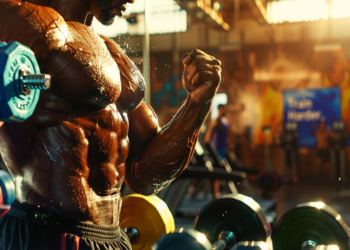Embarking on a bodybuilding journey can be a bold and beneficial choice, but it can also bring about challenges, particularly in the realm of food and nutrition. The pressure to achieve a certain physique may lead some down a perilous path towards disordered eating behaviors. However, understanding the nuances of how eating disorders manifest in the bodybuilding community is crucial. Recognizing the warning signs and symptoms early on is imperative, but what comes next is even more vital. With the right guidance and support, you can navigate towards a healthier relationship with food while pursuing your bodybuilding goals.
Key Takeaways
- Bodybuilding culture's emphasis on aesthetics can contribute to eating disorders.
- Recognizing warning signs like obsessive thoughts and social withdrawal is crucial.
- Seeking professional help and support is essential for overcoming eating disorders.
- Implementing balanced nutrition strategies and prioritizing mental health are key in maintaining a healthy relationship with food.
Understanding Eating Disorders in Bodybuilding
To comprehend the complexities of eating disorders in bodybuilding, it is crucial to delve into the intersection of mental health and physical appearance within the sport. Bodybuilding culture often places a heavy emphasis on achieving a certain aesthetic, with competitors striving for low body fat percentages and well-defined muscles. This intense focus on physical appearance can lead to the development of unhealthy relationships with food and body image.
Within bodybuilding, dietary restrictions are common practice. Competitors often follow strict meal plans, counting calories and macronutrients meticulously to achieve their desired physique. While these dietary restrictions are a fundamental aspect of the sport, they can sometimes spiral into disordered eating patterns. The pressure to adhere to extreme diets, combined with the constant comparison to other competitors, can contribute to the development of eating disorders.
Understanding the impact of bodybuilding culture on dietary habits and mental well-being is essential in addressing eating disorders within the sport. By fostering a supportive and balanced approach to nutrition and training, individuals can strive for their athletic goals while prioritizing their overall health and well-being.
Recognizing Warning Signs and Symptoms
Recognizing warning signs and symptoms of eating disorders in bodybuilding is pivotal for early intervention and support in maintaining both physical and mental well-being within the sport. It's crucial to pay attention to behavioral changes that may indicate a problematic relationship with food. These changes can manifest as obsessive thoughts about food, extreme calorie restriction, frequent weight fluctuations, and social withdrawal. By being vigilant and proactive in identifying these signs, you can help prevent the progression of disordered eating habits.
To further understand the impact of eating disorders in bodybuilding, let's explore the physical consequences and emotional toll associated with these conditions:
| Physical Consequences | Emotional Toll | Behavioral Changes |
|---|---|---|
| Nutrient deficiencies | Anxiety and guilt | Obsessive exercise |
| Muscle loss | Depression | Avoiding social events |
| Hormonal imbalances | Isolation | Secretive eating habits |
Seeking Help and Support
Seeking professional guidance and a supportive network can be instrumental in overcoming eating disorders within the bodybuilding community. Support groups offer a safe space to share experiences, receive encouragement, and combat feelings of isolation that often accompany eating disorders. These groups can provide valuable insights and coping strategies from individuals facing similar challenges, fostering a sense of belonging and understanding. Therapy options, such as cognitive-behavioral therapy (CBT) or dialectical behavior therapy (DBT), can help address underlying issues driving disordered eating behaviors. A therapist specializing in eating disorders can work with you to develop healthier attitudes towards food, body image, and exercise, promoting sustainable recovery.
When seeking help, it's essential to prioritize professionals who understand the complexities of eating disorders in bodybuilding. Look for experts who can tailor treatment to your unique needs and goals. Remember, reaching out for support is a courageous step towards healing and reclaiming a balanced relationship with food and your body.
Implementing Healthy Nutrition Strategies
Wondering how to nourish your body effectively while supporting your bodybuilding goals? Embracing balanced eating is key to fueling your workouts and optimizing muscle growth. Aim to include a variety of nutrient-dense foods in your diet, such as lean proteins, complex carbohydrates, healthy fats, and plenty of fruits and vegetables. Strive for a balance that meets your body's energy needs while providing essential nutrients for recovery and performance.
Nutrient timing is another crucial aspect to consider. To support muscle repair and growth, focus on consuming protein and carbohydrates around your workout sessions. Pre-workout meals should be rich in carbohydrates for energy, while post-workout nutrition should include protein to aid in muscle recovery.
Prioritizing Mental Health and Self-Care

To maintain a strong foundation for your bodybuilding journey, it is imperative to prioritize your mental health and practice self-care consistently. Mental wellness and self-love are essential components that contribute to your overall well-being and success in bodybuilding. Here are some strategies to help you prioritize your mental health and self-care:
| Self-Care Strategies | Description | Benefits |
|---|---|---|
| Regular Exercise | Engaging in physical activity releases endorphins, boosting your mood and reducing stress levels. | Improved mental clarity and reduced anxiety. |
| Mindfulness Practices | Incorporating mindfulness techniques such as meditation or deep breathing can help you stay present and manage stress effectively. | Increased self-awareness and emotional regulation. |
| Adequate Sleep | Prioritizing quality sleep allows your body to rest and recover, supporting overall mental wellness. | Enhanced cognitive function and mood stability. |
| Social Connections | Building strong relationships and maintaining social connections can provide emotional support and a sense of belonging. | Reduced feelings of loneliness and increased feelings of happiness. |
Frequently Asked Questions
How Do Bodybuilding Competitions and the Pressure to Achieve a Certain Physique Contribute to the Development of Eating Disorders in Athletes?
In bodybuilding competitions, the drive for a specific physique can lead to unhealthy eating patterns. The pressure to excel may overshadow mental health needs. Athletes benefit from balanced nutrition guidance to safeguard their well-being and prevent eating disorders.
What Are Some Common Misconceptions About Eating Disorders in Bodybuilding, and How Can They Be Debunked?
You might believe that bodybuilders always have perfect body image and nutrition education. But in reality, they too face misconceptions about eating disorders. By increasing awareness and promoting balance, these myths can be debunked.
How Do Societal Standards of Beauty and Masculinity Impact Bodybuilders' Relationships With Food and Their Bodies?
In the world of bodybuilding, societal beauty standards sculpt your perception of self. Media's portrayal of ideal masculinity can distort your relationship with food. Overcoming mental health stigma is vital for embracing true self-worth.
How Can Coaches and Trainers Support Athletes in Developing a Healthy Relationship With Food and Their Bodies?
To help athletes develop a healthy relationship with food and their bodies, coaches should provide nutritional guidance and emotional support. Encouraging mindful eating practices and promoting body positivity fosters overall well-being and performance.
Are There Specific Challenges That Bodybuilders Face in Recovery From Eating Disorders, and How Can They Be Addressed?
Recovery challenges can be daunting for bodybuilders dealing with eating disorders, but with tailored support strategies, progress is possible. Acknowledge setbacks, embrace patience, and seek professional help to navigate this journey effectively.
Conclusion
In conclusion, it's crucial to remember that a healthy relationship with food is essential in bodybuilding. Don't let the pursuit of perfection lead you down a dangerous path. Remember, Rome wasn't built in a day, and neither is a strong, healthy body. By recognizing warning signs, seeking help, and implementing healthy nutrition strategies, you can navigate the challenges of eating disorders in bodybuilding with resilience and strength. Take care of your body and mind, they are your greatest assets.














